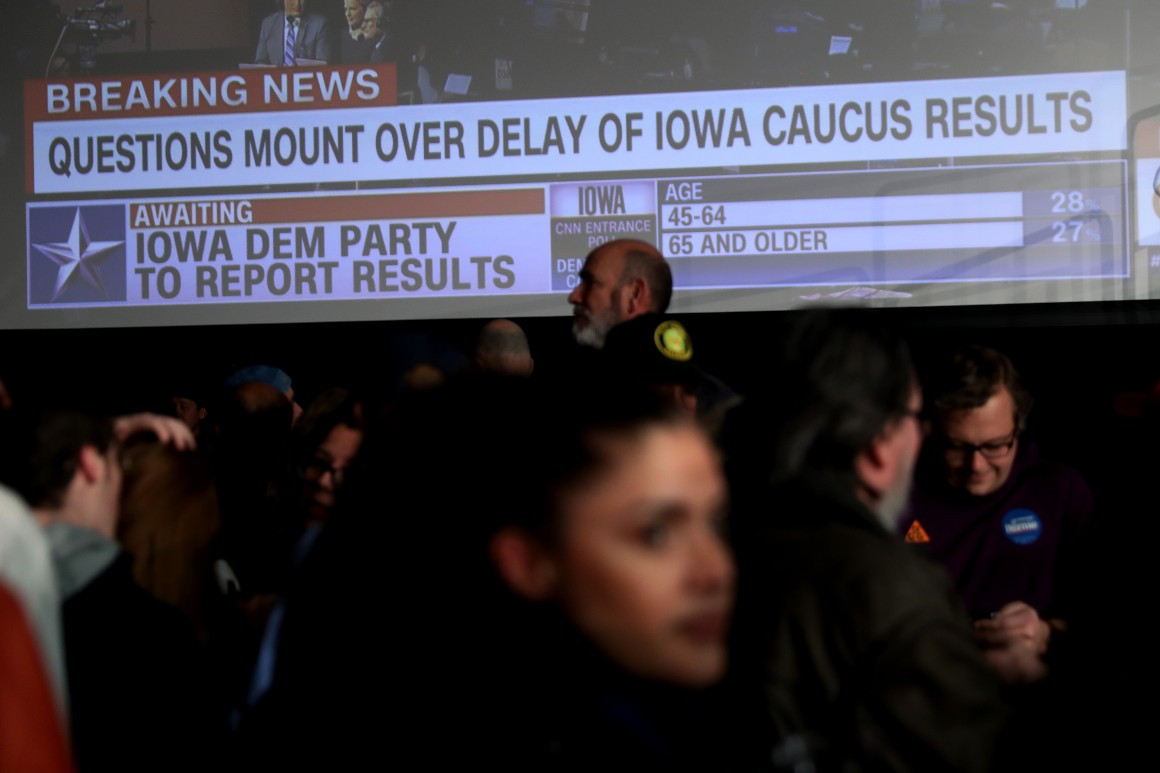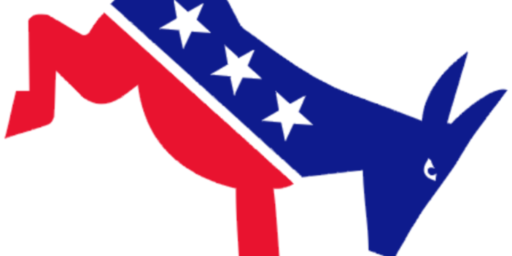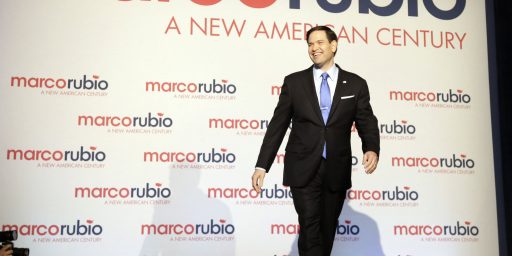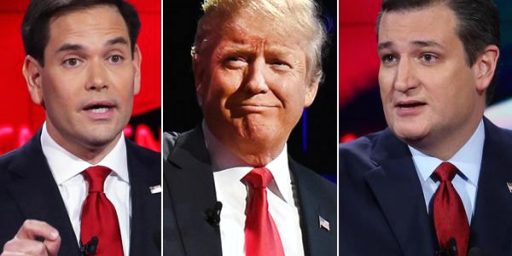Will Iowa and New Hampshire Lose Their Special Place?
Nevada is mounting a challenge to the rural, lily-white states that always go first in the presidential primary gauntlet.

POLITICO’s David Siders and Elena Schneider report “It might just be game over for the Iowa caucus.”
The siege of Iowa and New Hampshire has begun.
The two states with privileged places on the presidential primary calendar are finding their roles more threatened than ever before — most recently in the form of a bill introduced in Nevada this week to move that state’s nominating contest to the front of the line in 2024.
On its own, the Nevada encroachment would mean little. For years, Iowa and New Hampshire have successfully defended their one-two position from states eager to jump ahead. But the combination of Iowa’s botched 2020 caucus and increasing diversity in the Democratic Party’s ranks has made the whiteness of Iowa and New Hampshire all the more conspicuous, putting the two states on their heels and throwing the 2024 calendar into turmoil.
“There’s no reason in the world that those states should go forward so early, because they’re not representative of what 90 percent of the country’s all about,” said former Senate Majority Leader Harry Reid, a Nevada Democrat who remains influential in party politics. “America looks different than it did 50 years ago, when these traditions were put in place, and the Democratic electorate looks really different.”
He added, “It’s no longer palatable, as far as I’m concerned, for those states to take precedence over states like South Carolina and Nevada.”
That Iowa and New Hampshire are absurdly unrepresentative has been the subject of quadrennial controversy for quite some time now. Beyond, that, if we’re going to select major party Presidential nominees through a staggered series of primaries and caucuses, it’s simply unfair for the same two states to always go first. And, of course, the caucus method is absurdly undemocratic even compared to primaries.
But other states have been trying to push their way to the front of the line for as long as I can remember and the parties have both, for reasons I don’t fully understand, continued to privilege Iowa and New Hampshire.
The legislation marked the first real offensive in what is likely to be a drawn-out war over the outline of the 2024 presidential nominating process. In Iowa, the state’s Democratic Party chair, state Rep. Ross Wilburn, said he is “prepared to do whatever it takes to keep Iowa first in the nation.” And in New Hampshire, Bill Gardner, the longtime secretary of state, said neither the Democratic National Committee nor the Republican National Committee will dictate to his state when it can vote.
“The status of the primary was not given to New Hampshire by the parties,” Gardner said, referring to the state law that requires New Hampshire to hold its primary at least seven days before any “similar election” in another state. “We have a law, and we’ll comply with our law.”
Iowa has a similar law on its books, stating that it must hold its caucuses at least eight days before any other nominating contest.
While the parties have been loath to actually punish states for violating their rules, they could simply require that no contests held before a given date will be counted. Regardless, Iowa and New Hampshire have thus far prevailed in the fight.
This time, though, the fallout may be fatal. Tom Perez, the former DNC chair, has blasted the tradition of Iowa and New Hampshire going first. In Nevada, Reid has been calling since last year for his state to both do away with its caucus system — which would appease national Democrats — and go first in the nominating process. The bill introduced this week, in addition to switching the state’s caucus to a primary, would set the date for the second-to-last Tuesday in January.
Nevada’s Democratic Assembly Speaker, Jason Frierson, suggested the bill was a starting point for a “national conversation about what makes sense.”
Pretty much everyone agrees that having candidates spend a year eating pancakes and hanging out in the living rooms of influencers in two rural, lily-white states is an absurd way to sort candidates. And, increasingly, it doesn’t even accomplish that function—Joe Biden finished 4th in Iowa and an embarrassing 5th in New Hampshire—contests where Pete Buttigieg and Bernie Sanders traded 1-2 finishes—and yet ran away with the nomination shortly thereafter.
Still, as irrational as the system is, Iowa and New Hampshire’s interest in maintaining the status quo seems to be a lot greater than any momentum to change it. And, as the piece points out, there isn’t really much time to hash this out. The 2024 campaign, at least on the Republican side, is going to start any minute now.






Do you mean that Biden finished fifth in New Hampshire?
As Secretary Gardner points out, state law in NH requires our primary to be a week before any other state’s. Nevada moves theirs earlier, guess what, NH is 7 days before.
There’s history and tradition, sure that’s part of it. But don’t discount the revenue boost it represents to our little state…thus, the fight to maintain the status quo.
I’ve lived in a number of states and at least people here take the primary seriously. Whether it’s because it’s a small state that favors retail politics or the history/tradition or a combination of both, I’m impressed.
@Jen: I think it plays the role sports does elsewhere. And I don’t know that it lends itself to retail politics any more than any other small state; it’s just that the outsized attention it garners forces candidates to waste a lot of time there.
Objectively, my preference is that there be no caucuses and that smaller states go first. After that, the interests of the parties diverge. NH and Iowa going first makes sense for Rs as the demographics more accurately reflex the demographics of R voters. But Nevada and SC going first makes greater sense for Dems. Regardless the demographic profile of the Dem voters will diminish the salience of NH and Iowa for Dem presidential contenders. NH hasn’t picked a winner since Kerry in 04 and for Iowa, 2008 with Obama. (Intentionally ignoring 2012)
On the R side you need to go back to 2000 for NH not to pick the eventual R nominee. Interestingly Iowa hasn’t chosen the eventual R nominee since 2000. Iowa’s preference for long shot R candidates maybe why R operatives tend to downplay the state at caucus time. Despite the seeming match of demographics and voters, Iowa shouldn’t be particularly high on a R candidates list of primary states where to focus.
While I agree with @Jen: on the economic boost NH receives and the seriousness that the voters take the primary process, neither will make a difference in capturing candidate interest if the results don’t portend the eventual outcome.
@Jen:
So the 2022 primary could actually be conducted in conjunction with the Nov 2021 general election.
That would be helpful to local governments to save expense by reducing the number of election days per year.
Perhaps the kick-off of the 2022 primary season could begin, say, March of 2021. Ain’t politics grand!
I can’t think if two states that look LESS than the rest of American than Iowa and New Hampshire. The Dakotas and Wyoming at least have Native American populations. Lilly white is an understatement for Iowa and New Hampshire.
@EddieInCA:
Maine and Vermont are both whiter than NH and Iowa.
@CSK: Ha, was just going to say the same thing… 🙂
@CSK: @Jen:
Well, now I know. But… with all snark intended… Being #3 and #4 in whiteness doesn’t really help the case.
@Jen:
Nevada should just pass the same law as NH. A few months of both states in turn moving up their primary by a week until it’s scheduled for sometime next week and we can finally get the next election season going.
It will be interesting to watch the national parties challenge the state legislatures. I believe that both Iowa and New Hampshire have state laws requiring the major parties to have their presidential caucuses/primaries a week before any other state’s. This is true more broadly as well: state laws generally ignore the existence of the national parties. The only real weapon the national parties have is to take away delegates for the national convention. I look forward to the arguments before the Supreme Court when IA/NH assert a national party can’t do that.
@Neil Hudelson: In all seriousness, I’m guessing that some form of that is what’s going to happen. My question then is, what happens? Is there a compelling argument for the Supreme Court to handle (I honestly can’t think of what the case would be, since the Constitution says states have jurisdiction over handling their elections, but this would be an argument between the states, yes? So the SC would be the logical deciders?)
@Jen:
Perhaps the compelling issue would be something along the lines of, Iowa and New Hampshire are allowed to set their own election laws but the way these laws are worded they are setting dates for every other state? It is kind of like a state saying our income tax will be 10 percent less than New York and then getting mad if New York tries to drop their tax rate below 10 percent. I am not a lawyer (or a politician, or even an American) but I don’t see how in the long run a state’s ability to set election law can be relative to other states.
@Michael Cain:
@Jen:
I’m pretty sure that there is existing case law that has the effect of saying that the states can set their primaries whenever they want, but the parties, as private enterprises can ignore the results. I really don’t see the supremes taking this up.
Each party is likely to set a calendar that reflects the parties needs, not necessarily what the states want. If Dems want to promote states that reflect the party’s voters and diminish NH and Iowa, they could easily rule out caucuses and then schedule Nevada and SC the week after NH, leaving the candidates to decide where it is worth spending time.
At this moment, the 2024 presidential primary campaign season needs to be considered a non-event as the incumbent president is a Dem. That can change, but the interesting campaign is on the R side now.
@Pete S: I get what you’re saying, but it’s actually the reverse. The way NH’s law is worded affects only New Hampshire: our contest shall be held 7 days prior to any similar contest in another state. So, it doesn’t have any direct impact on any state but NH.
Of course, if every state tries to be first, there’s a problem, but the Constitution is pretty clear that the time/place/manner of elections is determined by each state. Congress could conceivably step in, but we all know how that goes… 😐 I won’t hold my breath.
@Pete S:
You can always take ten percent off any real positive number and have a real positive number greater than zero as a result. If NY’s tax were 1%, then yours would be 0.9%
If you meant ten percentage points lower, then you’re out of revenue if NY lowers their tax to 10%.
This isn’t just pedantry (though it is that). People get confused and are easily fooled by percentages. For instance, when the value added tax in Mexico was raised from 10% to 15%, most news reports, and most people, said it was a 5% raise. It wasn’t. it was a 50% raise. People paid half again as much in tax, not one twentieth again as much.
@Sleeping Dog:
@Jen:
Here’s a wild idea:
Have each party finance and organize their own primary elections.
I’d allow parties to piggyback on scheduled state elections, provided the parties paid a proportional, and substantial, sum to the state in return for the service it renders.
I just moved away from Iowa last week and one of the only things I’m happy about is never having to caucus again. It’s dumb and time consuming and inherently classist. In my precinct biden didn’t even make it past the first round and Bernie took it.
That said it is such a boom to the local economy that it is going to be hard for Iowa to give up. Downtown Des Moines has been building more hotels for years and there is a well maintained web of politicos even in the off years. It’s going to take a lot for them to dismantle without a fight.
@Kathy:
Yes, I meant percentage points, I was speaking sloppily. You are right that not understanding the difference is a big issue.
@Jen:
I get what you are saying too. I guess in the long run the law is unenforceable if another state wants to fight hard enough. Let’s suppose that some really enthusiastic pro-Trump State Republican Party wants to give Trump a chance to win their delegates before any opposition can be raised. Let’s say Florida. Trumpy governor and legislature. If they announce they will hold their primary two weeks from now, is New Hampshire prepared to hold theirs next week? Are they prepared and able to sue to stop this from happening? If neither happens they no longer have a law because it was based relative to other actors they do not control.
I know my example is ridiculous, but eventually the challenge to the first in the nation primary is going to come from someone going to ridiculous lengths. And I would not put it past Trump or Florida Republicans to game the system to his advantage.
Population of New Hampshire, 2020: 1,366,275
New Hampshire Square Miles: 9,350
Population of San Fernando Valley (a part of Los Angeles): 1,540,948
San Fernando Valley Square Miles: 260
Population of Iowa, 2020: 3.16 Million
Iowa Square Miles: 56,272
Population of Los Angeles: 3.98million (Los Angeles City ONLY, not the metro area)
Los Angeles Square Miles: 503 (in which the San Fernando Valley is included)
I’m tired of tiny, tiny, tiny states setting the agendas for the rest of us. Fvcking tired of it.
@EddieInCA: I get that, I really do.
On the other hand, lesser-known candidates have NO shot, none, if a big state like Cali goes first. Or really any state with an expensive media market.
Sure hope both parties really like the big national names if we go that route, because any lesser-known will be toast.
I love having all of the candidates here–and any of them do have the opportunity to break through the noise (witness, for example, Secretary Buttigieg). I also understand that we aren’t in any way representative of the country as a whole.
@Kathy:
Party financing of the primary occurs in some states. NH and IA, want to remain first for the revenue that comes into the state during the winter months and for the states to get notoriety that it otherwise wouldn’t receive.
@EddieInCA:
Like @Jen:, I understand your point, and I agree with her that it gives an somewhat obscure candidate a chance to standout. If Mayor Pete had been forced to open his campaign with the CA primary, he would have been swamped by the cost of advertising in the Cali markets.
Now that CA has moved their primary up to March, they really do have a say in who the nominee will be.
@Jen: It’s not a choice between Iowa & New Hampshire or California & Texas, though, is it?
Oh, here’s an idea — Puerto Rico goes first. And it doesn’t trigger the NH law.
And then we have a territory with no electoral votes setting the agenda…
@Pete S: @Jen
The big question is are they CAPABLE to successfully sue (say Florida) to stop Florida from conducting their primary whenever Florida chooses? Would NH even have standing?
I seems to me that the only course of action that NH has is to keep moving their primary (in order to comply with NH state law)
@Jen:
@Sleeping Dog:
I’m not asking for California to be first, second, third, or even fourth. I’m asking for the states up front to be representative of the country as a whole. Make Pennsylvania first. New Mexico. Florida. Delaware. North Carolina. Georgia. Not podunk states that have an outsized representation to their ACTUAL representation.
How different would the 2016 GOP primaries been if South Carolina was first, or Georgia, or Pennsylvania. Does Trump still win? I doubt it. We might be into the second Nikki Haley administration. How different would have 2008 been if Illinois was first? Hillary would be been finished much earlier. My larger point is that having tiny states have this much influence is bad for democracy, in my opinion, because it creates a semblance of momentum that can set a narrative that has no basis in reality.
@EddieInCA:
Understand. Though I’m in NH, I’m pretty agnostic as to if the state should go first or whenever. Objectively, for Dems it makes more sense for SC or Nevada go first, since those states better reflect the Dem voter. But for Rs, NH and IA first makes sense.
Another thing to consider is selecting the candidate through the primary process the best way to do it? Over time, there have been a few posts by our hosts questioning if we get the best or even better candidates from this process. That is something to consider.
I’m going to pick on Iowa particularly here. Not only is it not representative, it is a diseased State. It’s handling of the COVID epidemic was “Mad Max: Beyond the Thunderdome” in slow motion. They have no respect for human life and no decency when it comes to people who want to opt out of their sick suicide cult. They condemned hundreds of illegal immigrants to death by neglect in their horrible but (to Iowa economy) vital meat packing plants, and covered up the death toll. It’s a backward state with terrible values and should not be consulted in any way.